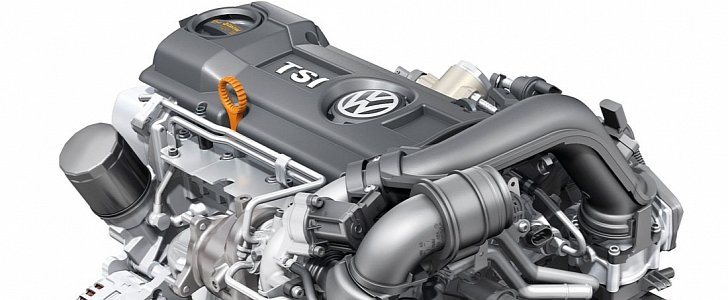The particulate filter is pretty much mandatory in diesel cars these days. Its association with diesel-powered cars brought it the handle DPF, which stands for diesel particulate filter. Now, though, the system designed to remove particulate matter from the exhaust gas of diesel cars will be adapted for gasoline engines.
As you might have already heard, the gasoline direct-injection (GDI) engine can emit more hazardous particulate matter and soot than diesel mills equipped with a particulate filter. Unfortunately, that’s the tradeoff automakers have to pay for the superior fuel economy compared to a port fuel-injected gasoline engine and the superior output numbers.
The Volkswagen Group, the automaker whose reputation was severely damaged by the Dieselgate fiasco, announced that it will implement the particulate filter in its direct-injection mills starting from calendar year 2017. According to VW, the said particulate filter can reduce the yucky stuff coming out the car’s exhaust pipes by up to 90 percent.
Dr. Ulrich Eichhorn, the Head of Group Research and Development at the Volkswagen Group, explains what’s what in a rather boastful manner: "Following increases in efficiency and lower CO‚ output, we are now bringing about a sustained reduction in the emission levels of our modern petrol engines by fitting particulate filters as standard."
The first nameplates and engines to receive the gasoline particulate filter (GPF, I suppose?) are the Volkswagen Tiguan 1.4 TSI and the Audi A5 2.0 TFSI. The tentatively named GPF will find its way under the hood of these models in June 2017. “Implementation will then follow in further models and engine generations,” added the German manufacturer.
On a tangent, the Volkswagen Group also vowed to reduce the nasty stuff coming out of its diesel cars with the help of AdBlue. Here’s Mr. Eichhorn again: "In the future, all [diesel] models will be equipped with the latest and most efficient SCR catalytic converter technology."
Well, well, well, look who’s turned 180 degrees.
The Volkswagen Group, the automaker whose reputation was severely damaged by the Dieselgate fiasco, announced that it will implement the particulate filter in its direct-injection mills starting from calendar year 2017. According to VW, the said particulate filter can reduce the yucky stuff coming out the car’s exhaust pipes by up to 90 percent.
Dr. Ulrich Eichhorn, the Head of Group Research and Development at the Volkswagen Group, explains what’s what in a rather boastful manner: "Following increases in efficiency and lower CO‚ output, we are now bringing about a sustained reduction in the emission levels of our modern petrol engines by fitting particulate filters as standard."
The first nameplates and engines to receive the gasoline particulate filter (GPF, I suppose?) are the Volkswagen Tiguan 1.4 TSI and the Audi A5 2.0 TFSI. The tentatively named GPF will find its way under the hood of these models in June 2017. “Implementation will then follow in further models and engine generations,” added the German manufacturer.
On a tangent, the Volkswagen Group also vowed to reduce the nasty stuff coming out of its diesel cars with the help of AdBlue. Here’s Mr. Eichhorn again: "In the future, all [diesel] models will be equipped with the latest and most efficient SCR catalytic converter technology."
Well, well, well, look who’s turned 180 degrees.











